#Gives him a motivation to reconnect with his interest in bugs and stuff like when he was a kid…
Explore tagged Tumblr posts
Note
his flower...
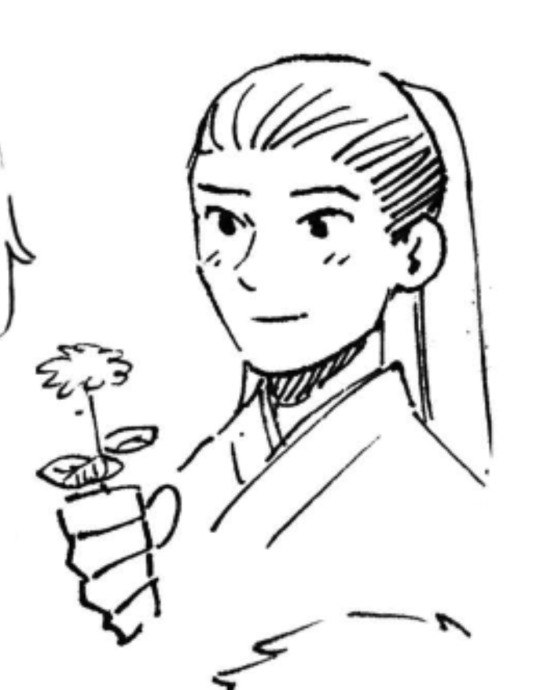

Aww, from the signing doodle board and the Adventurer’s Bible long illustration… He likes flowers he likes shells, just a guy and his flower he picked from the side of the road, what’s not to love. Nature lover boy…
#Dungeon meshi#delicious in dungeon#Toshiro nakamoto#Shuro#he’s so cute he looks so genuinely happy what…#It really doesn’t look storebought which is insane to me. He went and picked a flower with his noble hands from the dirt somewhere#In both of these it can be assumed it’s for Falin/he’s thinking about her which. I’m sobbing#He knows she wouldn’t want a neat trimmed bouquet bc she loves raw nature stuff. His love for her frees him a lil in its own way….#Gives him a motivation to reconnect with his interest in bugs and stuff like when he was a kid…#This is the man who got his wedding proposal rejected bc she wants to travel and went “good for her good for her”#SNAIL TOSHIRO FOR THE WINNNNN#There’s stuff to analyze here but ik toshiro positivity gets some ppl aggressive I’mma stop here pls no hate on this post <3#Answering this ask at the speed of light. Gonna answer some others tonight#Nature lover toshiro
319 notes
·
View notes
Text
i’ve been thinking about this post from a couple days ago and how i shared my four questions of character development but didn’t actually give an example of what my answers look like and it’s bugging me a bit because it occurs to me that it’s kinda just. lobbing a tool out there without documentation on how to use it properly rip
so uh. further details with examples ft. the bitter snow cast.
#1: what are they looking for?
all characters have an UNFULFILLED DESIRE that motivates them to action. the more central to the story the character is, the harder this must be to attain, as a general rule. this is, ideally, NOT an exterior goal. instead, it is the intrinsic wellspring from which the character’s goals and aspirations emerge.
EXAMPLES:
cassandra: it’s complicated. she is a character defined more by what she lacks than what she wants, per se; she does not feel secure of her place in the world, she craves trust because she feels she is distrusted, she craves respect because she feels she is overlooked, she craves love because she feels unloved. she doesn’t want to be a servant. she is terrified of insignificance, of being forgotten. she does not fit, and this hurts her. she is riddled with self-loathing and self-doubt because of the discrimination she has endured due to her saporian heritage. but if pressed to explain what she wants… she can’t summon a true answer. she doesn’t know what she wants, so what she is looking for fundamentally is to figure that out.
rapunzel: complicated again. she is a character defined in large part by what other people want from her. a people-pleaser who becomes anxious, persistent—even forceful—in her efforts to make everyone happy. she isn’t accustomed to paying attention to her own desires, and tends to neglect them unless she is acutely unhappy. i think she is looking for herself, more than anything.
varian: he is searching for answers. he wants to understand how the world works, to discover what it has to teach him. simple.
caine: she is looking for freedom. her life has been a long succession of horrific losses: her father was brutally taken from her, her mother became horribly ill, poverty and familial obligation robbed her of what remained of her childhood, she became disillusioned with the faith her aunt tried to share with her, her best friend died in her arms. she wants vengeance, and she also wants to stop carrying these ghosts with her, and she also wants to stop looking over her shoulder all the time and waiting for the next loss to catch up with her.
zhan tiri: she is looking for peace. she is the oldest living being in existence, and she came from nothing, and every single significant moment in her unfathomably long life has been soaked in blood and pain and death. her intrinsic nature is to hunger—always needing, always restless, always empty—and more than anything, she longs to break this endless circle of want.
#2: what’s stopping them?
every character must have an OBSTACLE which DISRUPTS their pursuit of what they’re looking for. it is the thing standing in their way. this is NOT the antagonist—it is the reason the character cannot easily overcome the antagonist. ideally it is something intrinsic.
EXAMPLES:
cassandra: she has, again, a complicated answer—because the very thing she is looking for is the same thing that stands in her way. how can she discover her basic, most primal want if she can’t even articulate her goals? she wants, at the beginning of the story, to join the watch—but not because she wants to join the watch, so much as joining the watch is a proxy for cassandra assimilating fully, for being coronan through and through, for scrubbing herself clean of the stain of her parents’ legacy—and that proxy is itself merely a proxy for her desire to belong—and her desire to belong is, in turn, a proxy for the agony of not knowing herself. she is piling bandaids on top of bandaids on top of bandaids on top of hemorrhages.
rapunzel: she is trapped in her own story. an evil witch kidnapped the magical lost princess, who escaped and came home; a miracle. the sundrop gifted its power to the lost princess; destiny. she a peacemaker and a mediator; it is her job to fix problems. narratives piled on narratives and she’s lost—or rather, never had—the insight to recognize that there is more to her than the stories people tell about her.
varian: his crushing need for approval is the key thing standing in his way. it isn’t just that his father’s disappointment or his village’s distrust make him warier of free experimentation; it is also, and perhaps even more so, that he is afraid of finding the wrong answers. answers that won’t help people. answers that his friends and allies won’t like. answers that change his basic view of the world in ways that feel antithetical to who he is. this fear holds him back from pursuing the truth.
caine: she is looking in the wrong direction; she is trying to not care, as if by not caring she can trick the universe into not taking anything else away. she is someone who cares so deeply trying to sever herself from everything she cares about without actually letting it go, which is of course an exercise in futility.
zhan tiri: what she wants is, quite simply, impossible. this is not a human answer because she is not human. contentment is and will always be something she is not capable of feeling, and chasing it is nothing but another exercise in insatiable hunger.
#3: what are they going to do about it?
this is about ACTION. it is not an option for a character to do nothing; the nature of the unfulfilled desire is that they are COMPELLED to seek it, somehow, by some means. if the answer to this question does not involve the character DOING SOMETHING, you need to return to question number one and fix the answer there.
EXAMPLES:
cassandra: she is going to fling herself headlong and without hesitation after whatever concrete goals feel like they might “fix” the lack she feels. even if a short term goal (like helping rapunzel sneak out) clashes or is contradictory with a longer term goal (like joining the watch). even if it is an obviously stupid idea (like her secret correspondence with rosalia morcant). even if it is an impulse with little if any rational basis (like fixating on finding varian, or joining the fight in socona). she is, essentially, throwing stuff at the wall to see what sticks, because without knowing what she wants, she can’t form a coherent “quest” for herself.
rapunzel: she is going to follow the path of least resistance with whatever narrative feels the least restrictive to her at any given time. when she is fresh out of the tower, reconnecting with her real family and throwing herself into becoming a princess is that narrative. later, taking adira’s and xavier’s advice to pursue her destiny by questing for the moonstone replaces that narrative. since none of these narratives fully suit her—they are all boxes she tries to fit into—she will eventually grow discontent and cast them aside to try something new, until she finally breaks this cycle.
varian: he is going to fall into a cycle of hesitant side-stepping leading to crisis leading to frantic charge forward until he identifies this pattern and chooses to step calmly but courageously into unknown territory. his instinct is to try to go around, to find an oblique solution, but to get what he wants he will ultimately need to just face his fear head on—and deep down he is willing to do that.
caine: she is going to run, and fight, and keep running and fighting until her legs give out beneath her. vengeance appeals to her, and she’s going to chase it with everything she’s got while trying to protect what she has; her intense drive is tempered by caution, which manifests in a pragmatic approach to pursuit of her exterior goals.
zhan tiri: she is going to continuously and experimentally refine and broaden her definition of “hunger” with the aim of hitting on something that allows her to feel satiated. she is going to line up goals and systematically chew threw them until there’s nothing left. she is, eventually, going to devour the whole cosmos and then probably die.
#4: who do they think they are?
this is a question about the character’s SELF-IDENTIFICATION. how do they PERCEIVE themselves? how do they choose to DEFINE themselves? what do they see when they look in the mirror?
EXAMPLES:
cassandra: she is untrustworthy. she is ignored. she is likable but not lovable. she doesn’t fit anywhere. she’s empty. she’s unsure. she’s drowning in doubt. she is insignificant, unimportant. she has been wronged, somehow. she wants to be a hero. she is someone who wants to do the right thing. she never stops trying. she’s stupid and reckless and incapable and doesn’t deserve any of the things she wants. she probably cares too much.
rapunzel: she is good. she is kind. (she is better than other people, in some small way. she sees the potential for goodness that other people can’t, or won’t.) she is worthless. she exists to make the world a better place. she is a princess, so she has to lead. she is the sundrop, so she has to heal. she is strong. (she is weak.) her determination to be kind and willingness to trust are her best qualities.
varian: he’s probably a lot smarter than most people he knows. he doesn’t know anything, but he wants to. he’s reckless. he’s not good enough. he can’t replace his mom. he’s accident prone. he’s a disappointment. he moves too fast. he thinks too fast. he doesn’t really need to sleep. he’s better with chemicals and formulas and machines than people. he’s not someone people want to be friends with. he could do great things if people—especially his dad—would just believe in him for once.
caine: she is an asshole and there is nothing wrong with her. she’s callous. she’s selfish. she’s out for her own interest first. she’s fine. (it was her fault cornaīn died. it’ll be her fault if her mom dies, or if neasa dies, or if any more of her crew dies, or if cassandra dies.) she isn’t afraid, she isn’t hurt, she’s angry. the only person she can rely on is herself, and the only person she wants to rely on is herself. she’s not anxious, she’s being smart.
zhan tiri: she loves, and it hurts, and she loves anyway. there is a way to break the circle and she is going to find it; it isn’t over until the end; but nothing lasts but hunger. she has done nothing wrong, ever, in her life. she has so many regrets she could drown in them if she weren’t immortal. she is beautiful, stop screaming.
…and that’s the bedrock of a character.
every individual action, every specific goal, every thought and feeling, is ultimately guided by the clash between this internal core with the realities of the setting, plot, and choices of other characters. cognitive dissonance between answers #1-3 and answer #4 is a breeding ground for inner conflict, and answers #1-3 are the raw material from which the spine of the character’s arc is sculpted.
[bonus round: this method comes from a scene in the pre-broadway houston run of the musical wonderland, wherein a character poses these questions to alice; her answers are:
#1: “i’m looking for my lost child.*”
*this being both literally her child who is lost but also metaphorically her own sense of wonder and discovery, which she has lost touch with.
#2: “i do! i keep getting in my own way, it’s all i do!”
#3: “i’m trying to figure that out!”
#4: “i’m chloe’s mother. i’m married to jack. these people are my friends. i’m a writer. i’m a teacher. i’m the dreamer of this dream. i’m lots of things; i’m my own invention!”
and when i first listened to this audio i was blown away by just how perfectly this distilled the character of alice down to her purest essentials so i immediately adopted it for character building purposes and i have never looked back because it is simple and it works.
in this scene there is also a fifth question, “what are you afraid of?” (paraphrasing: “losing the people i love”) which i have over time sort of just lumped in with how i answer the other four, because i find it to be less evocative on its own. however, it is useful information to know about a character and i recommend keeping it in mind when answering the other four.]
81 notes
·
View notes
Note
Near, Mello, Misa and Matsuda for the character meme
ALREADY ANSWERED FOR MISA (X), BUT:
–
NEAR + FIRST IMPRESSION:
I must admit I wasn’t a fan of Near at all the first time I just watched the anime. He came off really dull to me, and felt like a lesser version of L. I never read the second half of the manga until recently, so watching the Japanese dub of the anime once was the only impression of Near I ever had back then. I did think he was kind of charming in some of the fanfics I read, but he definitely was close to the bottom of the list of Death Note characters I cared about when I was younger.
NEAR + IMPRESSION NOW:
Near actually became one of my top 4 faves when I read the manga in my twenties! I was finally over L’s death and able to view the second half of the series much more objectively. I also think Near comes off way more deep and interesting and full of personality in the manga than he does in the anime. He was so funny and relatable and heartbreaking in weird ways, and I appreciated how he’s actually one of the more decent human beings in the series. He’s not motivated by self-interest or fascinated by Light in any sort of personal way, and that’s such a satisfying change from L at that point in the story. I love how well he foils Light’s ego and how earnestly he tries to relate to and collaborate with Mello, even after some of the awful things Mello does.
NEAR + FAVOURITE MOMENT:
This moment when Near just pretends to butt-dial Kira in order to figure out Mogi’s identity instead of engaging Light in a meticulous battle of the wits caught me so off-guard and made me legit lol:


NEAR + IDEA FOR A STORY:
I want to read about Near and Mello spending a chill weekend together at the SPK HQ! Ahh, I just wish they’d had more time to actually hang out and communicate as adults.
NEAR + UNPOPULAR OPINION:
He’s very shippable, and deserves to be shipped more!
NEAR + FAVOURITE RELATIONSHIP:
I love his frustrating and tragic relationship with Mello. It really tugs on the heartstrings to see Near caring about and attempting to reconnect with his childhood rival like that.
NEAR + FAVOURITE HEADCANON:
He’s obsessed with the idea of family and home and as an adult is often trying to recreate a sense of one for himself out of the people around him, like his coworkers and his childhood peers.
–
MELLO + FIRST IMPRESSION:
I think I found child Mello funny and compelling, because his reaction to L’s death was basically the same bug-eyed incredulous upset reaction as mine. He’s very entertaining to watch as an adult with his incredibly dramatic schemes too, and his character design is great and so much fun to look at! I loved reading him in fanfics as well, especially when he was given a more complex personality than just yelling a lot and being obsessed with chocolate.
MELLO + IMPRESSION NOW:
My impression of Mello has wobbled around quite a bit as an adult! I think at first I found him not that sympathetic or interesting, because I found it so hard to forgive him for kidnapping Sayu and giving the order to slaughter so many of Near’s coworkers and other things like that. I just couldn’t relate to him that well, and sort of missed noticing the more complex parts of his character and the way he develops and grows as a person over the latter parts of the story. I admittedly have a bunch of trouble following the plot of the successor arc and keeping track of who knows what about what, so I think some of the subtler ambiguities about his character completely escaped my notice. I’m very grateful to @thoughtsbypsychicsab for giving me a better appreciation of him and the second half of the series in general with her thorough breakdown of the plot and the possible motivations of the characters. Y'all should check out her podcast btw, it does such a good job exploring the whole story: (X)
MELLO + FAVOURITE MOMENT:
This face is absolutely priceless:
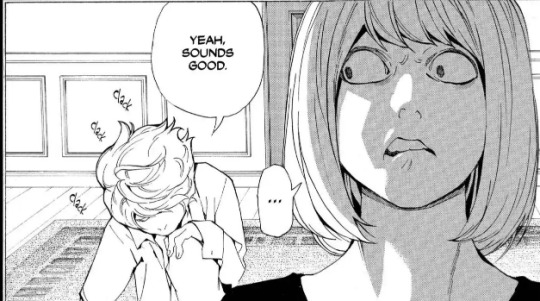
MELLO + IDEA FOR A STORY:
I really, really want to read a BxMello mafia fic!
MELLO + UNPOPULAR OPINION:
I don’t think he’s a big hotheaded loudmouth at all (and I’m totally @ing my younger self for this idea of Mello, because I completely characterized him that way myself when I was a teen). He’s as cool as a cucumber most of the time in the manga!
MELLO + FAVOURITE RELATIONSHIP:
His relationship with Near.
MELLO + FAVOURITE HEADCANON:
He liked collaborating with Near way more than he wanted to admit to himself or anyone else.
–
MATSUDA + FIRST IMPRESSION:
Pure, sweet cinnamon roll who never did anything wrong in his life. I really related to how much he questioned Kira’s impact on the world and I hated it when the other characters bullied him.
MATSUDA + IMPRESSION NOW:
I think he’s still very likeable and a great part of the cast who does some very important stuff, but he’s definitely a little shit sometimes too, especially in the successor arc! You don’t really see it in the anime, but in the manga he has wayyyy too much fun watching Light cheat on Misa, and seems to almost regress in maturity a lot after Soichiro’s death.
MATSUDA + FAVOURITE MOMENT:
Ohhh it’s so crazy when he shoots Light at the warehouse like that. It’s brutal, but works perfectly for his character.
MATSUDA + IDEA FOR A STORY:
I would love to see L and Light and Matsuda go out for drinks and karaoke sometime.
MATSUDA + UNPOPULAR OPINION:
It’s not THAT creepy that he hits on Sayu after the time skip, guys. She’s twenty and in unversity, and he’s thirty-one. It’s not adorable, but it’s not predatory.
MATSUDA + FAVOURITE RELATIONSHIP:
His respectful relationship with Soichiro is so sweet and adds so much heart and humanity to the story.
MATSUDA + FAVOURITE HEADCANON:
He idealizes the Yagami family a lot, and wishes that Soichiro and Sachiko were his parents very much.
34 notes
·
View notes
Text
ISTJ: Odo, “Star Trek: Deep Space Nine”
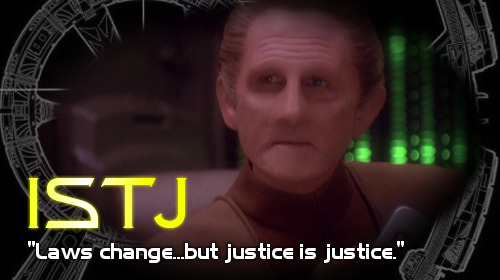
ISTJ – the Inspector, the Sentinel, the Trustee
Introducing a shape-shifter to the main cast of a Star Trek show meant that we had the chance to see him turn into all kinds of cool stuff. The limits of television storytelling, however, meant that certain restrictions had to be imposed on his powers. Odo must return to his gelatinous state every 15 hours to regenerate, or he risks falling apart. Also, judging from the unfinished shape of his face, he isn’t very good at imitating people (so, no Mystique-style infiltration missions for him).
Thus, despite his fluid body, Odo has the most rigid personality on DS9.
Dominant Function: (Si) Introverted Sensing, “The Study”
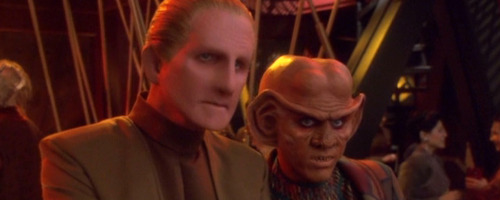
Odo keeps to a predictable schedule—the shopkeepers on the Promenade can set their chronometers by his passing when he makes his rounds. He’s a reliable and trustworthy Security Chief, impartial in his judgments whether he’s serving the Cardassians or Starfleet, because he’s only interested in the real facts of the matter. Starfleet keeps him on after they take over Deep Space Nine, thanks to his familiarity with the station and its denizens.
Odo makes a skillful investigator, picking up on details in his environment that build a picture of the crime or suspects he’s studying. This makes it especially difficult for Quark to get any shenanigans past him. Even when Quark seems to have innocuous motives, Odo suspects him, because past experience has taught him that, “You’re always up to something.”
Odo prides himself on his knowledge of humanoid nature, and often uses the phrase, “It’s been my observation—“ when explaining something he’s learned about them.
Though he could take on any form he wishes, Odo settles on the appearance of a middle-aged, grumpy, humanoid man. When he’s briefly turned into a human, he still keeps such a stiff posture that he gives himself a pinched nerve. He somewhat resembles the scientist who studied and raised him, Dr. Mora, right down to the hairstyle. Even his name is a riff on the label he was given as an “Unknown Sample” (“Odo’ital”) in the lab. Other Changelings he meets chide him for sticking to this one form so consistently, conforming to the looks of average humanoids, but something about the man the crew calls “Constable” seems to express Odo’s essence.
Odo has an innate sense of order, of the way things ought to be, that never changes despite the many cultures and environments he lives in. His people tell him that this is part of being a Changeling, the desire to bring order and sanity to the chaotic existence of the solids (non-shapeshifters). When he gets his own quarters, Dax enjoys making him crazy by moving his furniture around, shifting it slightly out of place. Odo can tell when it’s off by even a centimeter.
When he’s temporarily stuck in human form as punishment, Odo keeps his smooth, somewhat unformed face, partly as a reminder by the Founders that he’s not great at the details of the humanoid form. However, he becomes fascinated by the bubbles in his drink, now that he actually ingests sustenance. He eventually gets his shape-shifting powers back, but Odo keeps his new quarters so he can practice shape-shifting—and his old bucket, which he used to “sleep” in before he got his own space, just for old times’ sake.
Odo doesn’t know where he comes from at first. His quest for his origins remains a driving force, a hardwired part of his genetic code, and he’s grieved to discover that his people are in fact the tyrannical Founders of the Dominion. He’s torn between returning to the Great Link from which he was born, and staying with his loyal friends on Deep Space Nine.
As gruff and surly as he acts, Odo just wants someplace to belong. His personal experiences with the crew of DS9 help prove to him that solids are not evil, nor in need of domination. When he finally returns to the Great Link, he brings this knowledge with him in an effort to enlighten his people.
Auxiliary Function: (Te) Extraverted Thinking, “The Workshop”
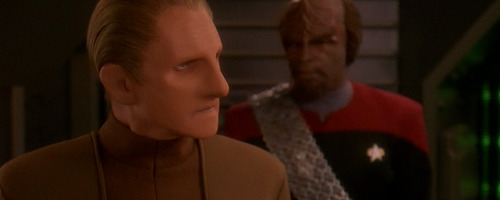
Odo lives to enforce law and order on the station. He has rules about not carrying weapons on the Promenade, not loitering, not sleeping, and a host of other things. He brooks no defiance of them. He especially loves calling Quark out for minor infractions of station regulations, just to make him miserable. He gets testy when Worf shows up and interferes with his methods, and has a list of security breaches on the Enterprise to rebut the Klingon’s accusations against the Constable’s abilities.
This side of Odo can go a bit fascist at times, like when he supports the declaration of martial law on Earth in the face of Changeling paranoia. When his job is called into question after Eddington’s defection, he complains that if he’d been given the broader authority he asked for, it never would have happened. He quietly believes that although things were grimmer under Cardassian occupation, at least they were safer. He illegally bugs Quark’s communications, and hints that he might do the same for others on the station as well.
Odo gets this drive from his people, the powerful Founders who run the Dominion empire in the Gamma Quadrant. The temptation to join the Great Link is not just that of returning home, but of joining a greater cause and power. He relates to their need to control the messy lives of solids, but ultimately he can’t go all the way with them in their desire to conquer the galaxy.
Tertiary Function: (Fi) Introverted Feeling, “The Deep Well”

Odo holds to a rigid, personal sense of justice. He serves many masters over the years—Cardassians, Starfleet, the Dominion—but he follows his own code before theirs. He refuses to ever carry or fire a weapon in the course of his duties (being able to shape-shift his arm into a whip certainly helps). A major reason he’s kept on by both Cardassian and Starfleet authorities is his commitment to the truth no matter who he’s working for.
Odo’s not crazy about anyone seeing him revert to his gelatinous state for regeneration time, nor really of anyone seeing his personal feelings about anything. He’s chagrined at the informal, affectionate nickname of “Constable” by which the crew calls him. He’s especially uncomfortable with the deference and adoration lavished on him by Weyoun and the Jem’Hadar, who see him and the Founders as gods.
Odo harbors an intense disgust of Quark that somehow also carries deep regard, though he’d never say it aloud (Quark, being an Fe-dom, can see it simply through Odo’s body language).
I really hesitate to praise anything about the Odo/Kira romance, but it does relax Odo emotionally. He’s awkward and fumbling in expressing his feelings to her over the years. When it’s finally out in the open, he’s the most sincerely happy we ever see him. Sadly, his commitment to his people, and to helping them become a peaceful race, must win out over his relationship to Nerys, and he bids his lover goodbye in the end.
Inferior Function: (Ne) Extraverted Intuition, “The Hiking Trails”

Once Odo reconnects with his people, he has trouble learning how to shape-shift. Not that he’s never done it before, but it was mainly in the line of duty. Learning how to “be” different objects and lifeforms, to experience their essence, seems mysterious and untenable. He asks a lot of questions of the Founder to try to understand the nature of the Great Link, but her answers sound to him evasive and vague.
His fellow lost Changeling-child Laas gets Odo to expand his understanding of what a Changeling can be. He doesn’t have to be defined by the humanoid shape he walks around in most of the day, but Odo doesn’t have much practical use for changing forms multiple times in a day unless it serves his law-keeping purposes. He even derides the humanoid imagination in the episode where everyone’s fantasies are coming to life, which doesn’t surprise Quark at all.
Odo’s Intuition usually serves to make him suspicious and paranoid, which is useful for a security officer but detrimental to his mental well-being. On the less aggressive side, he also gets caught up in linking and shape-shifting with the Female Founder, losing track of time when he’s supposed to be helping Kira and her resistance. However, Odo twice becomes a parental figure to a member of the Dominion—once to a lost Jem’Hadar child and once to a sick little baby Changeling—and he wishes very much to raise them differently from the abusive experiences he suffered, or from the expectations of their kind.
Ultimately, Odo proves more flexible than the other Changelings in one key point—accepting non-shapeshifters and their differences as good rather than something to be feared.
It’s this tiny change in one shape-shifter that ends the war and saves the galaxy.
#MBTI#Star Trek: Deep Space Nine#Odo#Rene Auberjonois#ISTJ#cognitive functions#Si-dom#Si#Introverted Sensing#Te-aux#Te#Extraverted Thinking#Fi#Introverted Feeling#Ne#Extraverted Intuition
23 notes
·
View notes